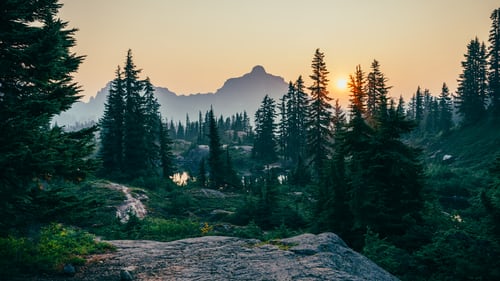Have you ever felt like you were in “survival mode”? Or… are you perhaps even feeling that way today?
Survival mode happens when we give over to our most basic survival instincts — driven by extreme fear or stress, we’re living minute-to-minute, in constant fight-or-flight mode. We can only react to every overstimulating thing around us… while still having to go through the motions of everyday life.
In survival mode, you don’t have time to worry about creative writing, how many books you’ve knocked off your to-read list, or even whether your socks match. In this state, you are facing down a literal or metaphorical grizzly bear in the literal or metaphorical wilderness, and sometimes it’s all you can do to just get through the day in one piece.
While this state may sound especially familiar to individuals who suffer from PTSD, most of us have experienced survival mode at some point in our lives — again, our fight-or-flight responses can be equally triggered by a literal grizzly bear or a metaphorical one (such as a looming deadline, urgent situation, hospitalization of a loved one, finals week, an important job interview, financial troubles, a global pandemic, political unrest, and so much more).
And many people live in this state — a state of constant anxiety, stress, fear, overwhelm, and reactiveness. But whether we’re new to this state or we’ve been wired into it from early childhood, it’s not an ideal way to live. It’s a passive/reactive state, a state in which we develop a tunnel vision that does not let us see beyond our own fear.
That being said, if you are living in survival mode, it is not your fault. I want to make that really clear. Again, many of us (including myself) have developed defense mechanisms over the years that automatically put us into that state. But — it is possible to change that wiring.
It may seem like a long journey from survival mode to a place where we are actively living our lives, and even thriving. But it is possible, and if we want to write or produce our best and most meaningful creative work, it is necessary.
So what does this look like for you? A great starting place is understanding that you’re not alone, and asking for help. It took me actual years to realize that asking for help did not indicate weakness, but instead was a sign of great personal bravery and strength. Please don’t repeat my mistake.
Whether that help looks like deadline extensions at work or school, support from fellow creators, or a visit to a doctor or therapist (or all of the above) is up to you. But please do take that step.
Next, ask yourself not only what you need to live a more healthy-feeling and fulfilled life, but what you want. Because you are allowed to want a better and more fulfilling life for yourself.
These are only the beginning steps in what will be for many of you a long journey. But I encourage you to take them, because getting to the other side — where you are able to take a proactive role in your own life and explore your true potential as a creator — is worth it.
Words & warmth,
Sarah

